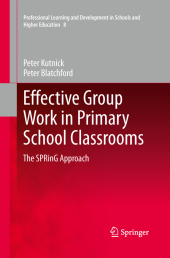 Neuerscheinungen 2015Stand: 2020-02-01 |
Schnellsuche
ISBN/Stichwort/Autor
|
Herderstraße 10
10625 Berlin
Tel.: 030 315 714 16
Fax 030 315 714 14
info@buchspektrum.de |

Peter Blatchford, Peter Kutnick
(Beteiligte)
Effective Group Work in Primary School Classrooms
The SPRinG Approach
Softcover reprint of the original 1st ed. 2014. 2015. xviii, 212 S. 21 Tabellen. 235 mm
Verlag/Jahr: SPRINGER NETHERLANDS; SPRINGER 2015
ISBN: 9400798415 (9400798415)
Neue ISBN: 978-9400798410 (9789400798410)
Preis und Lieferzeit: Bitte klicken
Drawing upon developmental psychological, social psychological and classroom research, this book develops a new social pedagogic approach to classroom learning, with a stress on group work, which will be of interest to researchers, teachers and policy-makers.
This book offers a challenge to traditional approaches to classroom teaching and pedagogy. The SPRinG (Social Pedagogic Research into Groupwork) project, part of a larger research programme on teaching and learning funded by the Economic and Social Research Council (ESRC), was developed to enhance the learning potential of pupils working in classroom groups by actively involving teachers in a programme designed to raise levels of group work during typical classroom learning activities. Internationally, the SPRinG project is the largest evaluation of effective group working methods in comparison to traditional teaching, with findings that show raised levels of pupil achievement and a doubling of sustained, active engagement in learning.
The opening chapters present arguments regarding the relationship of social interaction and children´s cognitive development and examine theories that explain why social interactional processes should be integrated into primary school pedagogic practices.
Next, the book describes the conceptual and methodological basis for the SPRinG studies, especially its focus on the relational approach, the type of involvement of teachers and classroom planning. Further chapters present key results and describe the background and methods used to establish SPRinG-based effects on pupil progress in mathematics, literacy and science, including both macro and micro assessments; how the SPRinG approach affected pupil-pupil interactions and teacher-pupil interactions, as measured by systematic on-the-spot observations and analyses of videotapes of groups working on specially designed tasks work; and effects on pupil self-completed measures of motivation and attitudes to group work.
The book also analyses reflections of teachers who have worked with SPRinG: moving from theory to practice as well as adding insights associated with implementing SPRinG principles in schools. Drawing upon developmental psychological, social psychological and classroom research, it develops a new and ambitious social pedagogic approach to classroom learning, with a stress on group work, which will be of interest to researchers, teachers and policy-makers.
This book includes contributions from Andrew Tolmie and Ed Baines, who were also involved in the ScotSPRinG and SPRinG projects.
Foreword.- 1. Can the grouping of children in classrooms affect their learning: an introduction to social pedagogy.- 2. Groups and classrooms.- 3. The SPRinG Project: the intervention programme and the evaluation methods.- 4. SPRinG at Key Stage 1: Effective group work with young children.- 5. Improving the effectiveness of collaborative group work at KS2: effects on pupil attainment, classroom behaviour and attitudes.- 6. ScotSPRinG: The effects of group work in Scottish primary schools on attainment, interaction and classroom relationships: Relational familiarity and class composition on support for group work; Andrew Tolmie .- 7. Teachers´ experiences of implementing the SPRinG Programme in schools; Ed Baines .- 8. Conclusions: The contribution of SPRinG to knowledge about collaborative group work.


